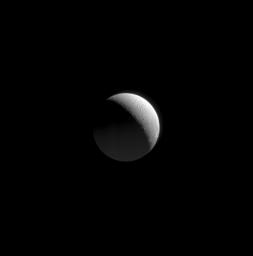
|
Approaching Enceladus
- Click the image above for a larger view
- Full-Res JPEG (707 x 715) (9.2 kB)
- Full-Res TIFF (707 x 715) (506.3 kB)
Caption:
As the Cassini spacecraft began its August 2008 flyby of Enceladus, the spacecraft approached over the moon's cratered north pole. Cassini acquired this view as the icy moon grew ever larger in its field of view.
In addition to the sunlit crescent at upper right, the faint glow at bottom indicates a secondary source of illumination: reflected sunlight from Saturn.
The view looks toward high northern latitudes on Enceladus (504 kilometers, or 313 miles across) from a perspective 71 degrees north of the moon's equator. The north pole is in shadow at center.
The image was taken in visible light with the Cassini spacecraft narrow-angle camera on Aug. 11, 2008. The view was obtained at a distance of approximately 448,000 kilometers (278,000 miles) from Enceladus and at a Sun-Enceladus-spacecraft, or phase, angle of 113 degrees. Image scale at maximum resolution is 3 kilometers (2 miles) per pixel.
Background Info:
The Cassini-Huygens mission is a cooperative project of NASA, the European Space Agency and the Italian Space Agency. The Jet Propulsion Laboratory, a division of the California Institute of Technology in Pasadena, manages the mission for NASA's Science Mission Directorate, Washington, D.C. The Cassini orbiter and its two onboard cameras were designed, developed and assembled at JPL. The imaging operations center is based at the Space Science Institute in Boulder, Colo.
For more information about the Cassini-Huygens mission visit http://saturn.jpl.nasa.gov/ . The Cassini imaging team homepage is at http://ciclops.org .
Cataloging Keywords:
| Name | Value | Additional Values |
|---|---|---|
| Target | Enceladus | Saturn |
| System | Saturn | |
| Target Type | Satellite | Planet |
| Mission | Cassini-Huygens | |
| Instrument Host | Cassini Orbiter | |
| Host Type | Orbiter | |
| Instrument | Imaging Science Subsystem (ISS) | |
| Detector | Narrow Angle Camera | |
| Extra Keywords | Crater, Grayscale, Shadow, Visual | |
| Acquisition Date | ||
| Release Date | 2008-09-17 | |
| Date in Caption | 2008-08-11 | |
| Image Credit | NASA/JPL/Space Science Institute | |
| Source | photojournal.jpl.nasa.gov/catalog/PIA10471 | |
| Identifier | PIA10471 | |
